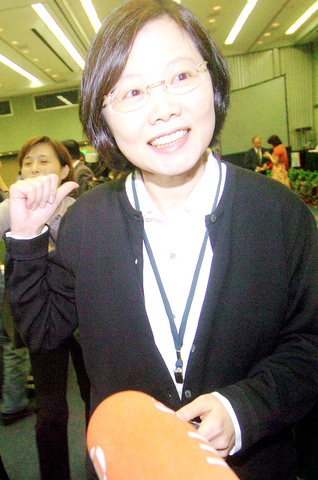Vice Premier Tsai Ing-wen's (蔡英文) determined attitude was well demonstrated during the Conference on Sustaining Taiwan's Economic Development held late last month.
Tsai, though well-known as head of the panel that developed former president Lee Teng-hui's (李登輝) "special state-to-state" theory (兩國論) in 1999, was locked in a heated debate at the conference with members of the pro-independence Taiwan Solidarity Union over the easing of the 40 percent cap on investment in China.
She was spotted during the conference breaks negotiating with other participants over plans to ease the investment ceiling, which was eventually listed with the "other opinions" -- those intended to serve as advice for the government, but which would have no binding effect on the Cabinet.

Known for her articulate and precise expression in English, Tsai played the role of conciliator in 2002 during her term as chairwoman of the Mainland Affairs Council (MAC), flying to Washington to explain President Chen Shui-bian's (
She convinced players in Washington that Taiwan had not changed its stance on cross-strait relations.
Tsai first took on the leadership of the MAC in 2000. Although she was not then a Democratic Progressive Party (DPP) member, she was well-trusted by the DPP government as well as President Chen Shui-bian (
"During her first year as chairwoman of the MAC, she simply would not talk to the press," said a senior cross-strait affairs journalist who wished to remain anonymous. "Now, she does, but what she tells you are only those things that she wants you to know."
While Tsai had once explained to reporters that her cautiousness is driven by a desire to avoid misunderstanding, some reporters complain that Tsai's remarks usually contain nothing but political language and rhetoric.
Tsai's professional attitude has garnered approval from both the pan-blue and pan-green camps.
"She does not bluff about something that will never happen or try to avoid difficult questions posed by lawmakers. That is really something," said former Chinese Nationalist Party (KMT) legislator Apollo Chen (陳學聖).
Former DPP legislator Shen Fu-hsiung (沈富雄) said Tsai's performance as head of a government agency should be a role model for her fellow government leaders.
"Her statements or answers to the legislature are always logical and clear," Shen said. "Sometimes I really felt that listening to her in the legislature was a joy."
Former KMT legislator Liao Feng-te (廖風德) said Tsai's perseverance and firm attitude impressed him the most, although he would not really appreciate it all the time.
"I questioned her on the MAC's policies many times and there were several quarrels between us on the legislative floor. However, she would insist on the rightness of her positions and explain them to me patiently -- even though I still believed that there were flaws in them. That was quite different from other government officials," Liao said.
The vice premier is also known for her tendency to retain a low-profile, which is typical of both her work and private life.
For instance, she was entitled to a driver when she was the MAC chairwoman and still has the right to this service as vice premier. But, she prefers to drive by herself. In addition, she has refused the service of bodyguards.
Despite the fact that her father passed away in the lead-up to the economic conference, she only asked to take a week off after the conference concluded.

An essay competition jointly organized by a local writing society and a publisher affiliated with the Chinese Communist Party (CCP) might have contravened the Act Governing Relations Between the People of the Taiwan Area and the Mainland Area (臺灣地區與大陸地區人民關係條例), the Mainland Affairs Council (MAC) said on Thursday. “In this case, the partner organization is clearly an agency under the CCP’s Fujian Provincial Committee,” MAC Deputy Minister and spokesperson Liang Wen-chieh (梁文傑) said at a news briefing in Taipei. “It also involves bringing Taiwanese students to China with all-expenses-paid arrangements to attend award ceremonies and camps,” Liang said. Those two “characteristics” are typically sufficient

A magnitude 5.9 earthquake that struck about 33km off the coast of Hualien City was the "main shock" in a series of quakes in the area, with aftershocks expected over the next three days, the Central Weather Administration (CWA) said yesterday. Prior to the magnitude 5.9 quake shaking most of Taiwan at 6:53pm yesterday, six other earthquakes stronger than a magnitude of 4, starting with a magnitude 5.5 quake at 6:09pm, occurred in the area. CWA Seismological Center Director Wu Chien-fu (吳健富) confirmed that the quakes were all part of the same series and that the magnitude 5.5 temblor was

The brilliant blue waters, thick foliage and bucolic atmosphere on this seemingly idyllic archipelago deep in the Pacific Ocean belie the key role it now plays in a titanic geopolitical struggle. Palau is again on the front line as China, and the US and its allies prepare their forces in an intensifying contest for control over the Asia-Pacific region. The democratic nation of just 17,000 people hosts US-controlled airstrips and soon-to-be-completed radar installations that the US military describes as “critical” to monitoring vast swathes of water and airspace. It is also a key piece of the second island chain, a string of

The Central Weather Administration has issued a heat alert for southeastern Taiwan, warning of temperatures as high as 36°C today, while alerting some coastal areas of strong winds later in the day. Kaohsiung’s Neimen District (內門) and Pingtung County’s Neipu Township (內埔) are under an orange heat alert, which warns of temperatures as high as 36°C for three consecutive days, the CWA said, citing southwest winds. The heat would also extend to Tainan’s Nansi (楠西) and Yujing (玉井) districts, as well as Pingtung’s Gaoshu (高樹), Yanpu (鹽埔) and Majia (瑪家) townships, it said, forecasting highs of up to 36°C in those areas